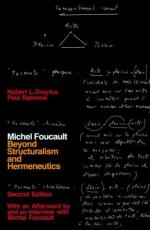|
This section contains 3,100 words (approx. 11 pages at 300 words per page) |

|
Michel Foucault, though trained in philosophy, never considered himself a professional philosopher. Still, his research into the historical formation of truth, power relations, and modes of recognition regarded as self-evident in various disciplines—most notoriously the figure of man—is an important contribution to philosophy and is itself strikingly original philosophical thought. Born in Poitiers, France, Foucault studied at the École Normale Supérieure under Maurice Merleau-Ponty, Jean Beaufret (1907–1982)—Martin Heidegger's major interpreter in France—and Louis Althusser (1918–1990). Foucault earned his License de philosophie in 1948 and Diplôme de psycho-pathologie in 1952. He taught in Sweden, Poland, and Germany before his appointment as the head of the philosophy department at the University of Clermont-Ferrand. After two years in Tangiers following the publication of Les mots et les choses (The Order of Things) in 1966, Foucault returned to France and the university at Vincennes, France, just after...
|
This section contains 3,100 words (approx. 11 pages at 300 words per page) |

|


